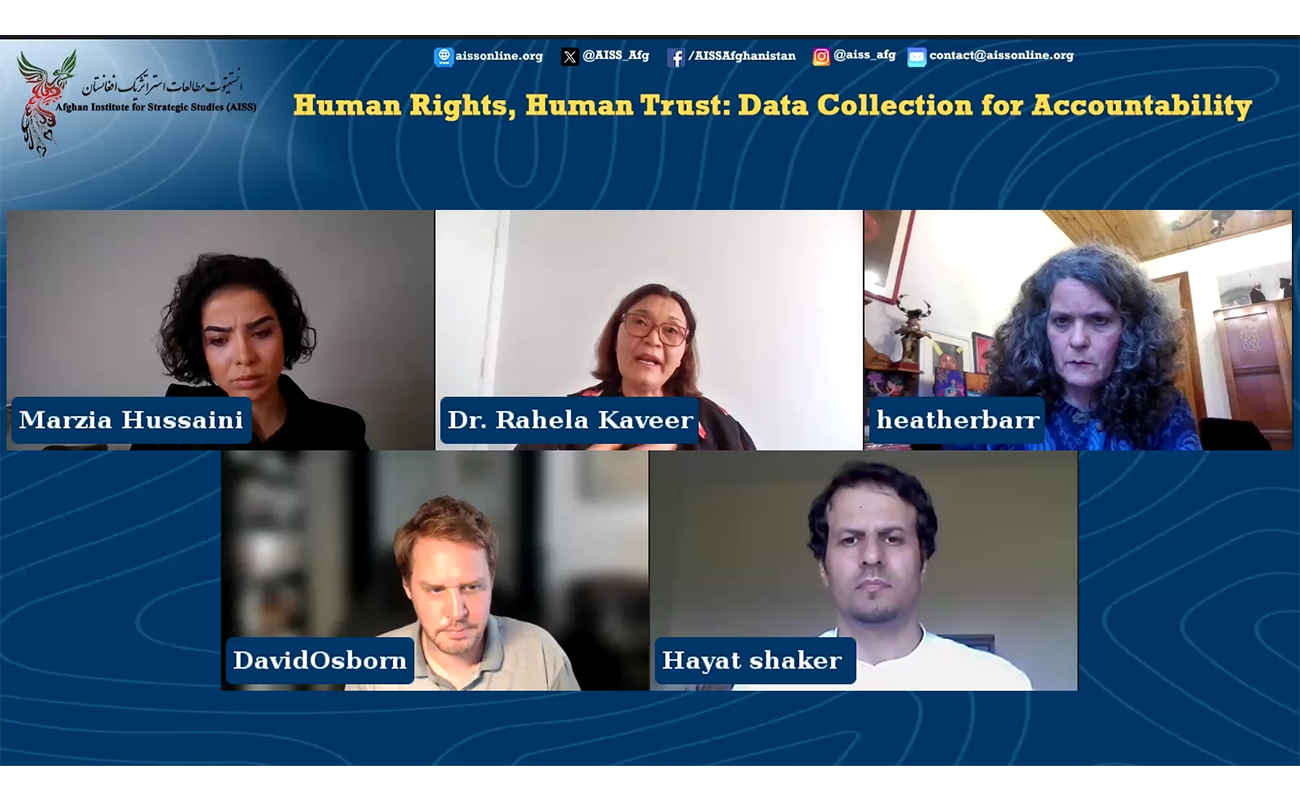Human Rights, Human Trust: Data Collection for Accountability
On August 13th, the Afghan Institute for Strategic Studies organized a webinar titled "Human Rights, Human Trust: Data Collection for Accountability." The webinar aimed to delve into the crucial topic of data collection for ensuring human rights and accountability.
The webinar was moderated by Marzia Hussaini, who began the webinar after introducing the speakers.
Heather Barr stated that they had to pivot quickly after August 15, 2021. They had experience working in countries with challenging security situations, such as closed countries like North Korea and Iran. She mentioned that obtaining information was difficult previously, but it was not nearly as pervasive as now.
She mentioned that due to their organization's challenges, they work remotely and use various methods for their research, including secure communication tools outside the country, media reports, and contacts with people familiar with the area.
After discussing the different human rights violations committed by the Taliban, she pointed out that what sets the Taliban apart from other authoritarian groups is their strong policies on gender.
David Osborn started by acknowledging the obstacles organizations face while gathering human rights violations on the ground. He spoke about the open sources of information and added that some content on social media could be used for human rights violations. Through content in social media, we can turn it into where it happened and when it happened and verify it. He gave the Panjshir exclusion as an example where the Taliban refused to accept the execution, but they were able to determine the accuracy of it by employing those methods.
In response to a question about the correlation between women’s health and human rights violations, Dr. Rahela Kaveer said that human rights violations have a direct impact on women’s health. Dr. Kaveer stated that the maternal mortality ratio is one of the main components when researchers look at health issues. She added that in 2022, based on the research, there were 620 per one hundred thousand lives at birth.
Afghanistan is considered one of the worst countries in the world when it comes to maternal health care.
She provided a detailed explanation of the five primary causes of maternal mortality. Her thorough research underscored that three of these causes are directly linked to human rights issues that mothers commonly encounter.
She mentioned that documenting human rights violations in Afghanistan is a dangerous undertaking.
Shaker Hayat discussed international law and the consequences of human rights violations, stating that what Afghanistan is experiencing should not just be labeled as gender apartheid or crimes against humanity but rather as a "policy of crimes." The Taliban previously committed genocide in 1998 in Mazar, redistributed land to other ethnic groups in the North, and forced women into marriage in the eastern provinces. From 2001 to 2021, Taliban terror attacks resulted in the deaths of approximately 200,000 civilians, 70,000 military personnel, and 8,000 NATO personnel, according to official Afghan authorities.
He added that after the Taliban regained power, their first target was the freedom of speech. They aimed to control the media to suppress information about their crimes.
The Panjshirian World Wide Council recently conducted a comprehensive research study, which revealed alarming findings regarding the actions of the Taliban in the past year. According to the research, a total of 283 innocent Panjshiris have been persecuted by the Taliban, and an additional 500 individuals have been subjected to torture. These distressing acts have been meticulously documented, shedding light on the severity of the situation.
Addressing the gravity of the issue, Hayat emphasized that the reports indicate a staggering 3500 human rights violations within the Panjshir Valley. It is important to highlight that the crimes committed by the Taliban carry significant legal implications, punishable by both national and international law. This underscores the urgency of addressing these violations and seeking justice for the affected individuals.
The program concluded with each speaker addressing the issues they face when gathering information and requesting the UN to establish a mechanism for easily monitoring human rights violations in Afghanistan.

